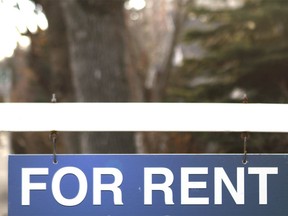It should be abundantly clear by now that an imbalance of supply and demand has been driving up the cost of both home prices and rents. It should therefore also be clear that reducing demand and/or increasing supply will help ease prices

With proponents of rent control ramping up efforts to pressure the Alberta government, a remarkable thing has been happening in the background: rents have actually been coming down.
For the first time since February 2021, the average rent in Calgary declined — for a one-bedroom apartment, the average was down 2.5 per cent from the previous month and down 1.1 per cent from the previous year, while the decline for a two-bedroom apartment was even more pronounced. That’s according to the latest report from Rentals.ca, which showed rents were also down in a number of major Canadian cities.
That obviously doesn’t erase the increases we’ve seen in recent years nor guarantee that rents will continue to decline. However, it certainly puts to rest the notion that government price controls are all that stand between us and perpetually increasing rents (imposed by greedy landlords).
Nonetheless, the group Alberta ACORN (Association of Community Organizations for Reform Now) has been targeting various UCP MLAs with protests and rallies, calling for the Alberta government to impose rent control. The Opposition NDP has also continued to push for similar measures.
The case for such policies rests on a narrative that doesn’t allow for rents to decline any other way. After all, if forces other than greed are driving prices, then maybe the solution lies elsewhere.
It should be abundantly clear by now that an imbalance of supply and demand — too much of the latter and not enough of the former — has been driving up the cost of both home prices and rents. It should therefore also be clear that reducing demand and/or increasing supply will help ease prices.
And sure enough, that’s what’s happening. As the Rentals.ca report notes, apartment completions have reached their highest total in decades and, at the same time, population growth has weakened.
Other smaller cities also saw rent increases. But no one is claiming that big city landlords suddenly became more generous while greed increased elsewhere. It simply shows that we have a lot more work to do when it comes to restoring balance to supply and demand.
There are likely many rent control proponents who would have us believe that we could simply cap and regulate rents while still trying to build up supply. That view, however, is misguided, and it’s why the Alberta government is right to resist this pressure.
Earlier this year, German economist Konstantin Kholodilin published a meta-study reviewing nearly all the literature regarding the effect of rent control policies — a total of more than 100 different reports. Perhaps not surprisingly, the review found that, indeed, legislated limits on rents or rent increases do affect rent prices.
However, the evidence also points to unintended and detrimental consequences. In fact, the evidence shows overwhelmingly that rent control policies lead to lower supply and less new rental unit construction. It often also leads to a decline in the quality of rental housing.
It wasn’t rent control that helped to ease rents here in Calgary. Rent control also didn’t keep Toronto and Vancouver from ending up with the highest rents in the country.
Accelerating our building boom is what will address affordability, and we should shun any policies that get in the way of that.
“Afternoons with Rob Breakenridge” airs weekdays from 12:30 to 3 p.m. on QR Calgary Radio